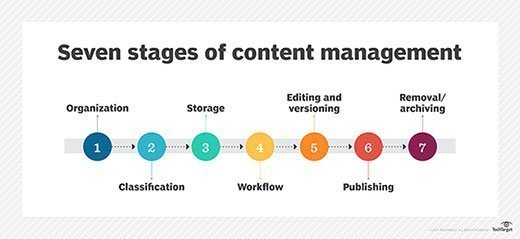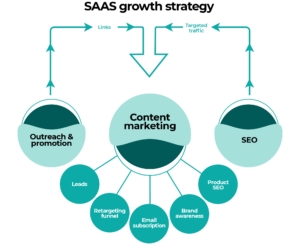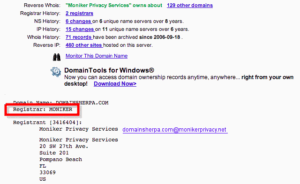Content management is a crucial aspect of digital marketing that often gets overlooked. But hey, don’t worry, I’m here to break it down for you! So, what exactly is content management in the world of digital marketing? Well, my friend, it’s all about creating, organizing, and optimizing content to attract and engage your target audience. It’s like being the conductor of an orchestra, carefully arranging all the elements to create a harmonious symphony of marketing success. Intriguing, isn’t it?
In this fast-paced digital era, where attention spans are shorter than ever, having a solid content management strategy is essential. It’s like having the secret recipe for a mouthwatering dish that keeps your audience coming back for more. By managing your content effectively, you can ensure that your brand’s message is clear, consistent, and irresistibly captivating. So, buckle up and get ready to dive into the exciting world of content management in digital marketing! Trust me, it’s going to be quite the adventure.

What is Content Management in Digital Marketing?
Content management in digital marketing refers to the process of creating, organizing, and distributing content across various digital platforms to attract and engage target audiences. It involves the strategic planning, creation, and optimization of content to drive traffic, generate leads, and ultimately, convert customers. Content management plays a crucial role in digital marketing as it enables businesses to effectively communicate their brand message, establish thought leadership, and build a loyal customer base.
With the rise of digital channels and platforms, content management has become a fundamental aspect of any successful digital marketing strategy. It encompasses various elements such as content creation, content distribution, content optimization, and content performance analysis. By effectively managing content, businesses can enhance their online presence, improve brand visibility, and drive meaningful interactions with their target audience.
The Importance of Content Management in Digital Marketing
Content management is essential in digital marketing for several reasons. Firstly, it allows businesses to create relevant and valuable content that resonates with their target audience. By understanding their audience’s needs and preferences, businesses can develop content that addresses their pain points, provides solutions, and establishes credibility.
Secondly, content management enables businesses to optimize their content for search engines. By incorporating relevant keywords, meta tags, and other SEO best practices, businesses can improve their organic search rankings and drive more traffic to their website. This, in turn, increases their visibility and reach to potential customers.
Content Creation and Optimization
When it comes to content management, the creation and optimization of content are key components. Businesses need to develop high-quality, engaging, and informative content that captivates their audience and encourages them to take action. This can include blog posts, articles, videos, infographics, social media posts, and more.
In addition to creating compelling content, businesses must also optimize it for search engines. This involves conducting keyword research, incorporating relevant keywords naturally throughout the content, and optimizing meta tags and descriptions. By doing so, businesses can improve their search engine rankings and increase their chances of being discovered by their target audience.
Content Distribution and Promotion
Once content is created and optimized, the next step is to distribute and promote it across various digital channels. This can include sharing content on social media platforms, sending out email newsletters, publishing guest blog posts, and collaborating with influencers or industry thought leaders to amplify reach.
Effective content distribution and promotion strategies are crucial in maximizing the visibility and reach of content. By leveraging the power of different digital channels, businesses can ensure that their content reaches the right audience at the right time, increasing the likelihood of engagement, shares, and conversions.
The Benefits of Content Management in Digital Marketing
Content management offers numerous benefits to businesses in the realm of digital marketing. Firstly, it helps establish thought leadership and authority within a particular industry or niche. By consistently producing high-quality and informative content, businesses can position themselves as trusted sources of information, attracting a loyal following and establishing credibility.
Secondly, content management allows businesses to nurture relationships with their audience. By providing valuable and relevant content, businesses can engage with their audience, build trust, and establish long-term relationships. This can lead to increased brand loyalty, higher customer retention rates, and ultimately, increased sales and revenue.
Furthermore, content management enables businesses to drive organic traffic to their website. By optimizing content for search engines and incorporating relevant keywords, businesses can improve their search engine rankings and attract more organic traffic. This can result in higher visibility, increased brand awareness, and ultimately, more conversions.
Content Management vs. Content Marketing
It’s important to note that content management and content marketing are closely related but distinct concepts. Content management refers to the overall process of creating, organizing, and distributing content, while content marketing focuses on using content strategically to achieve specific marketing goals.
Content marketing involves leveraging content to attract, engage, and convert target audiences. It includes strategies such as lead generation, nurturing, and conversion through the strategic use of content. Content management is the foundation of content marketing, as it involves the creation and distribution of content that supports marketing objectives.
Tips for Effective Content Management in Digital Marketing
To maximize the effectiveness of content management in digital marketing, businesses can follow these tips:
- Create a content strategy: Develop a well-defined content strategy that aligns with your business goals and target audience. This will guide your content creation, distribution, and optimization efforts.
- Know your audience: Understand your target audience’s needs, preferences, and pain points. Tailor your content to address these specific needs and provide value to your audience.
- Optimize for search engines: Conduct keyword research and optimize your content for search engines. Incorporate relevant keywords naturally throughout your content and optimize meta tags and descriptions.
- Utilize various content formats: Experiment with different content formats such as blog posts, videos, infographics, podcasts, and more. This will help diversify your content and cater to different audience preferences.
- Promote your content: Leverage social media platforms, email newsletters, guest blogging, and influencer collaborations to promote your content and increase its reach. Engage with your audience and encourage them to share and interact with your content.
- Monitor and analyze performance: Regularly analyze the performance of your content using analytics tools. Monitor metrics such as website traffic, engagement, and conversions to gain insights and make data-driven decisions.
Conclusion
Content management is a vital component of digital marketing, enabling businesses to create, distribute, and optimize content to attract and engage their target audience. By following effective content management practices, businesses can enhance their online presence, establish thought leadership, and drive meaningful interactions with their audience. With the right content strategy and implementation, businesses can achieve their marketing goals and drive long-term success in the digital landscape.
Key Takeaways: What is Content Management in Digital Marketing?
- Content management in digital marketing involves organizing and strategizing the creation, publication, and distribution of content.
- It helps businesses effectively manage their online presence and engage with their target audience.
- Content management systems (CMS) provide tools for creating, editing, and publishing content on websites and other digital platforms.
- Effective content management enhances search engine optimization (SEO) and improves website visibility.
- By managing content efficiently, businesses can provide valuable information to their audience and build brand credibility.
Frequently Asked Questions
What is the role of content management in digital marketing?
Content management in digital marketing refers to the process of creating, organizing, and managing content that is used to promote a brand or business online. It involves planning and strategizing the type of content to be produced, as well as ensuring its quality and relevance to the target audience.
Content management plays a crucial role in digital marketing as it helps in attracting and engaging users, driving traffic to a website, and ultimately converting them into customers. By consistently delivering valuable and informative content, businesses can establish their expertise in the industry, build trust with their audience, and enhance their online visibility.
What are the key components of content management in digital marketing?
Content management in digital marketing comprises several key components. Firstly, it involves content creation, which includes writing articles, producing videos, and designing graphics that align with the brand’s messaging and objectives. Secondly, it involves content organization, where the content is categorized and structured in a way that makes it easily accessible to users.
Thirdly, content management includes content distribution, which involves sharing the content across various online channels such as social media platforms, email newsletters, and websites. Lastly, it involves content analysis, where the performance of the content is measured and analyzed to identify areas for improvement and optimize future content strategies.
How does content management contribute to SEO?
Content management plays a significant role in search engine optimization (SEO). By creating high-quality and relevant content, businesses can improve their website’s visibility in search engine results pages. When search engines recognize that a website consistently produces valuable content, it tends to rank higher in search results, leading to increased organic traffic.
Additionally, content management allows businesses to incorporate relevant keywords and optimize their content for search engine algorithms. By strategically using keywords in titles, headings, and throughout the content, websites can improve their chances of ranking for specific search queries and reaching their target audience.
How does content management impact customer engagement?
Effective content management can have a significant impact on customer engagement. By creating compelling and valuable content, businesses can capture the attention of their target audience and encourage them to interact with the brand. Engaging content can evoke emotions, spark discussions, and prompt users to share their opinions or experiences.
Furthermore, content management allows businesses to tailor their content to different stages of the customer journey. Whether it’s informative blog posts for awareness, interactive quizzes for consideration, or customer testimonials for decision-making, well-managed content can effectively guide customers through the buying process and foster deeper engagement with the brand.
What are the benefits of implementing a content management system in digital marketing?
Implementing a content management system (CMS) in digital marketing offers several benefits. Firstly, it provides a centralized platform for creating, editing, and publishing content, making the content management process more efficient and streamlined. This saves time and resources for businesses, allowing them to focus on other aspects of their marketing strategies.
Secondly, a CMS enables collaboration among multiple team members involved in content creation. It allows for easy sharing of ideas, reviewing and editing content, and maintaining a consistent brand voice across different channels. Additionally, a CMS often offers features such as content scheduling, version control, and analytics, which further enhance the effectiveness of content management in digital marketing.
Final Summary: Understanding the Power of Content Management in Digital Marketing
In this fast-paced digital world, content management has emerged as a crucial aspect of successful digital marketing strategies. From creating captivating blog posts to crafting engaging social media updates, content management plays a pivotal role in attracting and retaining the attention of online audiences. By optimizing websites with relevant keywords and providing valuable information to users, businesses can enhance their online visibility and drive organic traffic to their platforms.
One of the key benefits of content management in digital marketing is its ability to establish a strong brand presence. Through consistent and high-quality content, businesses can showcase their expertise and build credibility among their target audience. By incorporating search engine optimization techniques, such as utilizing relevant keywords and meta tags, content managers can ensure that their content ranks high on search engine result pages, making it more discoverable for potential customers.
Additionally, content management allows businesses to nurture relationships with their customers by providing them with valuable and informative content. By understanding the needs and preferences of their target audience, content managers can create personalized content that resonates with their readers. This not only helps in building brand loyalty but also encourages customers to engage with the brand and take desired actions, such as making a purchase or subscribing to a newsletter.
In conclusion, content management is an integral part of digital marketing that helps businesses establish their online presence, attract organic traffic, and engage with their target audience. By implementing effective content management strategies, businesses can position themselves as industry leaders and drive meaningful interactions with their customers. So, whether you’re a small startup or an established brand, harness the power of content management to elevate your digital marketing efforts and achieve long-term success.







